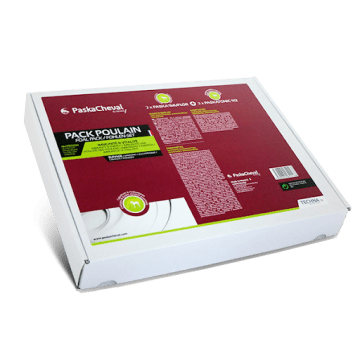Maintaining good health is a daily struggle for every horse. While foals, pregnant dams and athletic horses may appear to be in top form, their immune systems are under constant pressure, working tirelessly to recognise and, if possible, eliminate pathogens and other external aggressors that could weaken them. It's a daily battle for their bodies...
The two types of immunity
The horse's immune system can be divided into two 'families': non-specific (or innate) and specific (or acquired). Non-specific immunity enables the body to rapidly detect pathogens such as bacteria, food contamination, parasites or even foreign bodies, such as a thorn stuck deep in the skin, for example... Specific cells then "eat" the pathogens. The specific response knows how to recognise certain typical pathogens and then tries to eradicate them when they enter the body. This recognition is achieved in particular through vaccinations, which enable the body to identify certain aggressors, particularly viruses. From then on, this specific immunity takes concrete form either as cells or as proteins: antibodies. The immune system is therefore constantly working to maintain a constant balance in the face of all kinds of external intruders.
NON-SPECIFIC IMMUNITY
1st line of defence: innate, rapid, non-specific and has no memory
Not always sufficient to eradicate pathogens
SPECIFIC IMMUNITY
Adaptive, with greater speed, specificity, diversity and memory.

The first few hours are crucial
As with other mammals, the foal's first few hours are crucial, as it is born without an immune system. So it's essential for its survival that it can drink the famous colostrum, the mother's first 'milk', rich in cells from its mother's immune system, as soon as possible after birth - ideally within 6 hours. Gradually, over several months, the effectiveness of this immune transfer will diminish as the foal develops its own immunity.
An immune system unique to each horse
As in humans, while the immune system of horses is more or less strong and effective depending on the individual, correlating with age and genetics, general health is an important factor in its proper functioning. A horse that is well fed, has no deficiencies and lives in a healthy, appropriate environment will be better able to maintain an effective immune system. Similarly, the immune system can be put to the test if the horse comes into contact with other individuals who are potentially ill or carriers of disease... As you can see, there is no typical type of horse that needs help to boost its immune system. All horses may potentially need a little boost during periods of stress, such as the change of seasons, vaccination periods, convalescence periods, or the transition from gestation to lactation for a broodmare. In fact, the more a sport horse is stressed on a daily basis, the more its immune system will be stimulated. Solutions therefore exist in the form of cures to help the horse strengthen its immune system. Similarly, it is possible to accompany the foal in its first hours to help it integrate the immunity provided by colostrum and to help it develop digestive flora, absent at birth.
PaskaCheval offers a complete range of products to boost the immune system of horses throughout their growth and their sporting, leisure or breeding careers. Our team of experts in the field will be happy to advise you.
Talk to our experts
Paskacheval is a range of plant-based feed supplements and external care products designed to enhance the performance and well-being of every horse.


